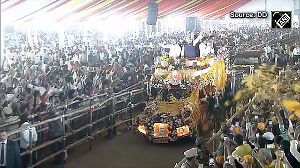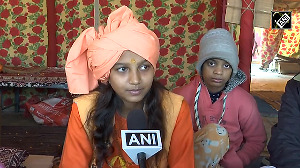
Three-time former Bihar chief minister Jagannath Mishra, one of the most powerful leaders of the state in pre-Mandal politics who brought the infamous 'Press Bill' to gag media, died on Monday after prolonged illness aged 82, family sources said.
Mishra, who was battling blood cancer for quite some time, suffered a massive heart attack at his Dwarka home in the national capital in the morning and died.
He is survived by three sons and three daughters. His youngest son Nitish Mishra was a minister in the Nitish Kumar cabinet. His wife had died last year.
Mishra's mortal remains will be cremated at his village Balua Bazaar in Supaul district on Wednesday.
Mishra was catapulted to the chief ministership of Bihar following the assassination of his elder brother Lalit Narayan Mishra, the then railway minister and a staunch Indira Gandhi loyalist, in 1975.
He went on to helm the politically volatile state twice more.
Mishra was the last Congress chief minister of Bihar between December 1989 and March 1990, and one of the biggest mass leaders before 'Mandal politics' pushed the Congress to the political margins in the state.
He also served as a Union minister in the P V Narasimha Rao cabinet.
A teacher of economics in Bihar University, he cut his political teeth under the tutelage of his elder brother Lalit Narayan Mishra.
He was a member of both the houses of the state legislature, but landed the chief minister's job in 1975 soon after his brother's killing in a bomb explosion at a railway function in Bihar's Samastipur. Jagannath Mishra was also grievously injured in the bomb attack but survived.
His first tenure lasted barely a couple of years as Presidents Rule was clamped on the state which had become the hotbed of the students agitation popularly known as the 'JP movement' which provided the backdrop for Emergency.
Mishra was back as the chief minister in 1980, when the Congress returned to power ousting the short-lived Janata Party government.
His three years in office were marked by populist initiatives like declaring Urdu as an official language of the state.
Mishra, otherwise considered media friendly, faced the collective outrage of the fourth estate when his government got passed the 'Press Bill', an instrument that sought to curtail the freedom of the press, in the Bihar assembly on July 31, 1982. The bill was said to have the blessings of Indira Gandhi.
It was seen as an onslaught on the freedom of expression and led to massive nation-wide outrage.
Protests erupted in several parts of the country and journalists held a nation-wide strike on September 3, 1982, which was considered as the most successful strike in the newspaper industry ever.
Bowing to the protests, Mishra withdrew the bill a year later when it was still awaiting presidential assent.
With the emergence of Rajiv Gandhi as political heir apparent to Indira Gandhi, Mishra's distance with the party's high command began to widen.
He went on to question the Centre's powers to fix royalty on minerals when mineral-rich Jharkhand was part of Bihar.
Mishra was removed as the chief minister and replaced by Chandrashekhar Singh.
In 1985, Rajiv Gandhi chose trade union leader Bindeshwari Dubey as the state Congress chief, and after Bihar returned the highest-ever tally for the Congress, the latter was made the chief minister only to be dropped three years later for reasons which included his suspected hobnobbing with dissidents led by Mishra.
Dubey was replaced by Union minister Bhagwat Jha Azad, who had to step down within a year as party MLAs rose in revolt against his alleged high-handedness.
Azad's successor Satyendra Narayan Sinha was eased out within six months on account of the state government's failure to control the Bhagalpur riots of 1989, one of the worst communal conflagrations in the state that left over 1,000 people, mostly Muslims, dead.
It finally fell back upon the shoulders of Mishra to lead the Congress at the hustings in the 1990 assembly elections.
The party lost to the Janata Dal but its tally stood at 71 seats in the 324-member assembly.
Mishra ended up becoming the last Congress chief minister of the state, while the party has hitherto failed to even come close to the 71 mark in nearly three decades now. He had a stint in the P V Narasimha Rao cabinet, but parted ways with the Congress when his old adversary Sitaram Kesri came to helm it.
Mishra floated his own outfit Bharatiya Jan Congress in 1999, which met with little electoral success. He later merged his party with Sharad Pawar's Nationalist Congress Party in 2001.
Later, Mishra gravitated towards the National Democratic Alliance, which assumed power in the state in 2005. His son Nitish Mishra was inducted into the state cabinet.
In the latter part of his political career, he got embroiled in the fodder scam which came to light during the tenure of his successor Lalu Prasad.
Along with Prasad, he was convicted in some of the cases. He was on bail for the last few months before his death.
The state government has announced a three-day state mourning as a mark of respect to the departed leader.
Congress president Sonia Gandhi condoled his death, saying Mishra always stood for the interests of the deprived and the marginalised minorities in society.
He will be remembered for a long time to come, Gandhi said.
Condolence messages have poured in from all sides, including Governor Phagu Chauhan, Chief Minister Nitish Kumar, his deputy Sushil Kumar Modi, state assembly Speaker Vijay Kumar Chaudhary and former chief minister and Rashtriya Janata Dal leader Rabri Devi.
'He was an acclaimed political leader and educationist. His death has caused an irreparable loss not just to Bihar but the entire country,' Kumar said in his message.











 © 2025 Rediff.com -
© 2025 Rediff.com -